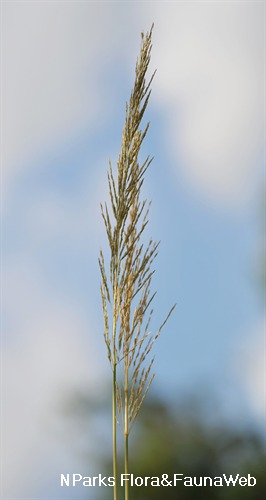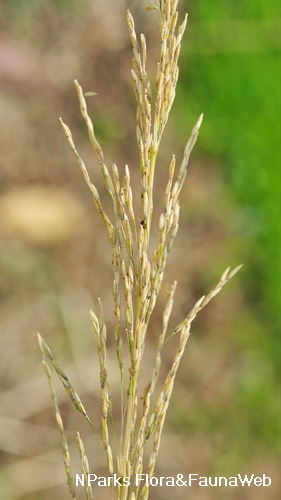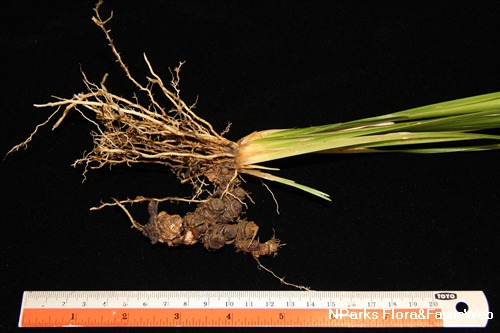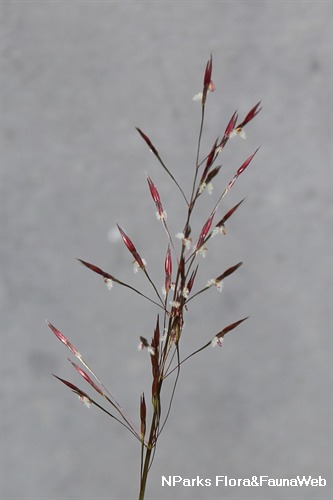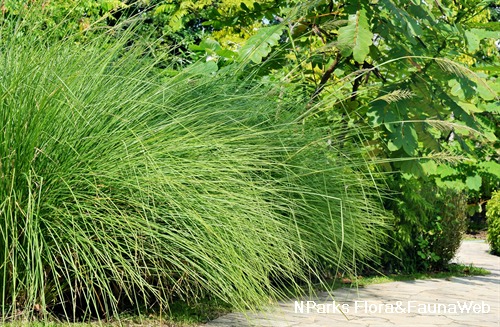
Back
Chrysopogon zizanioides (L.) Roberty
| Family Name: | Poaceae (Gramineae) |
| Synonyms: | Vetiveria arundinacea, Vetiveria muricata, Vetiveria odorata, Vetiveria zizanioides |
| Common Name: | Vetivergrass |
Name
Classifications and Characteristics
| Plant Division | Angiosperms (Flowering Seed Plants) (Monocotyledon) |
|---|---|
| Plant Growth Form | Grass or Grass-like Plant |
| Lifespan (in Singapore) | Perennial |
| Mode of Nutrition | Autotrophic |
| Plant Shape | Grassy |
| Maximum Height | 2.4 m |
Biogeography
| Native Distribution | India |
|---|---|
| Native Habitat | Terrestrial |
| Preferred Climate Zone | Tropical |
| Local Conservation Status | Non-native |
Description and Ethnobotany
| Growth Form | Perennial grass that forms dense, erect clumps. |
|---|---|
| Roots | Fibrous roots are long and white. When crushed, they emit a somewhat earthy, sandalwood-like fragrance. |
| Foliage | Narrow, linear leaves (25 - 50 cm long, 1 cm wide) are held erect. The leaves are tightly folded together, forming a V-shape in cross-section. The inner surface of the leaf (when the leaf is opened and flattened) is mostly covered by thin, parallel, white bands and has a green margin. They are held erect, but often bent backwards at a sharp angle near the tip. |
| Stems | It has an underground, horizontal stem known as a rhizome. The rhizome is composed of small, barrel-shaped segments and resembles a ginger rhizome (commonly called a root). |
| Flowers | It forms narrow panicles. |
| Cultivation | This species can tolerate occasional flooding. |
| Ethnobotanical Uses | Medicinal: Oil extracted from the roots is used in traditional medicine as an aphrodisiac, antiseptic or sedative. Others: It has phytoremediation potential, because it accumulates pollutants such as lead, arsenic, zinc, copper and petroleum hydrocarbons. In tropical climates, it is used for screening and to prevent soil erosion. Oil extracted from the roots is used in 90% of Western perfumes including the famous Chanel No. 5. The roots are woven together to make mats, baskets and screens which become fragrant when moistened. |
Landscaping Features
| Desirable Plant Features | Ornamental Foliage |
|---|---|
| Landscape Uses | General, Groundcover, Slope Stabilization |
Plant Care and Propagation
| Light Preference | Full Sun |
|---|---|
| Water Preference | Lots of Water |
| Rootzone Tolerance | Waterlogged Soils |
Foliar
| Foliage Retention | Evergreen |
|---|---|
| Mature Foliage Colour(s) | Green, Green - Bluish Green |
| Mature Foliage Texture(s) | Smooth |
| Foliar Type | Simple / Unifoliate |
| Foliar Shape(s) | Non-Palm Foliage (Linear) |
| Foliar Venation | Parallel |
| Foliar Margin | Entire |
| Foliar Apex - Tip | Acute |
| Foliar Base | Clasping |
Floral (Angiosperm)
| Flower & Plant Sexuality | Bisexual Flowers |
| Flower Colour(s) | Purple, Silver / Grey |
|---|---|
| Flower Grouping | Cluster / Inflorescence |
| Flower Location | Terminal |
| Inflorescence Type | Panicle |
References
| References | Yong J, Tan PY, Nor Hafiz Hassan, Tan SN. 2010. A Selection of Plants for Greening of Waterways and Waterbodies in the Tropics. Singapore: Chung Printing . 480 pp. |
|---|
Image Repository
Others
| Master ID | 29359 |
|---|---|
| Species ID | 3668 |
| Flora Disclaimer | The information in this website has been compiled from reliable sources, such as reference works on medicinal plants. It is not a substitute for medical advice or treatment and NParks does not purport to provide any medical advice. Readers should always consult his/her physician before using or consuming a plant for medicinal purposes. |

